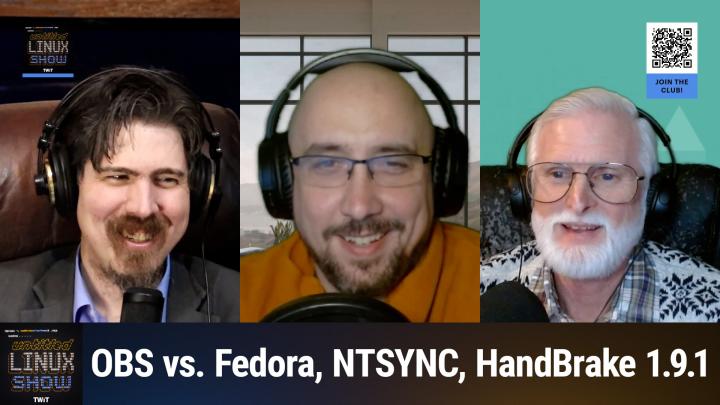Unrest in the Linux Kernel Community
AI created, human edited.
The latest episode of the Untitled Linux Show (episode 190) explores the recent drama surrounding Linux kernel maintainers, with hosts Jonathan Bennett, Rob Campbell, and Ken McDonald providing their insightful takes on the situation. The discussion centers around high-profile resignations and the ongoing tensions between factions within the kernel development community.
Asahi Linux Leadership Changes
The drama began with Hector Martin, the founder and lead developer of Asahi Linux (the project bringing Linux to Apple Silicon), announcing his resignation as the project lead. As Rob Campbell detailed, Martin cited that the project had "become less fun over time," with user frustrations about M3/M4 support and missing features taking a toll on his enjoyment.
In Martin's own words: "I'm resigning as lead of the Asahi project, effective immediately. The project will continue without me. I'm working with the rest of the team to handle the transfer of responsibilities and administrative credentials."
Fortunately, the Asahi Linux project will continue under the leadership of Sven Peter (co-maintainer) and Janne Grunau, an Asahi developer who's been working on the downstream kernel since April.
Rust in the Linux Kernel
The resignations come amid ongoing tensions about Rust code in the Linux kernel. Miguel Ojeda, described by Jonathan as "essentially the Rust for Linux guy," published a Rust kernel policy to avoid future conflicts. The policy clarifies that:
- Rust for Linux is not an official effort by the Rust project or foundation
- Many key kernel maintainers support Rust in the kernel
- Changes that break Rust-enabled builds aren't allowed (with exceptions for Rust subsystems)
- Duplicate C and Rust drivers aren't permitted (with temporary exceptions)
Rob expressed some skepticism about the policy coming from a Rust contributor rather than from Linus Torvalds or Greg Kroah-Hartman: "I guess I would feel maybe a little more confident about this policy if it actually came from Linus Torvalds, Greg KH, the Linux Foundation."
The "Thin Blue Line" Controversy
Perhaps the most contentious part of the discussion centered around another resignation - Karol Herbst stepping down as maintainer of the Nouveau driver (the open-source NVIDIA Linux graphics driver). Herbst's resignation came after another maintainer used the phrase "we are the thin blue line" in discussions about the kernel.
Jonathan provided context for non-American listeners: "In some places, among some people, that is a very controversial thing to say. In other places, among other people, that is not controversial at all." He explained that in some regions like Oklahoma, the phrase referring to police is uncontroversial, while in other places it's considered politically charged or even racist.
Herbst stated that this language "isn't creating an inclusive environment" and controversially added that "a maintainer speaking those words can't be kept." This statement particularly troubled Jonathan: "That is the statement that says someone that is from the other side of things politically needs to be cast out of this project, and that's not what open source is supposed to be about."
Ken McDonald offered a nuanced take: "I get the impression the maintainer was trying to say that as maintainers, we want to try to keep chaos out of the code, and unfortunately the phrasing he used to say that was a politically charged one."
The hosts had varying perspectives on how politics should be handled in open-source communities:
- Jonathan advocated for a strict separation: "Our rule is we do not talk about, we do not make political statements at all, period... We do not care what side it is."
- Rob suggested that the maintainer might not have realized the phrase's political connotations: "Maybe it's from a place like Oklahoma and did not even think about that."
- Ken pointed out that language evolves: "I have seen a lot of phrases over the years... that as a youth I didn't take any notice of, become politically charged."
Jonathan concluded that while controversial statements happen frequently on the Linux Kernel Mailing List, the call to remove someone for their political views is problematic: "The idea that if someone makes this statement, they need to be pushed out of the project... I think that is a terrible idea."
Moving Forward
Despite the drama, the hosts noted that both the Asahi Linux project and the Nouveau driver development will continue. For Nouveau specifically, Ken mentioned: "You've still got two people that are going to be remaining as Nouveau kernel maintainers, and they're also going to be working on replacing it with NOVA."
The discussion highlights the ongoing challenges of maintaining a collaborative, global open-source project while navigating different cultural contexts and political sensitivities.
Want to hear the complete episode, including the hosts' takes on HandBrake 1.9.1, the Fedora/OBS feud, and Civilization VII running on Linux through Steam's Proton? Check out episode 190 of the Untitled Linux Show, "A Fedoraish Direction," recorded on February 15th. Dive deeper into the world of Linux and open source with Jonathan Bennett, Rob Campbell, and Ken McDonald.
